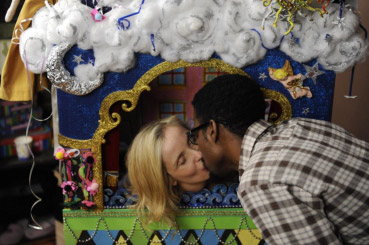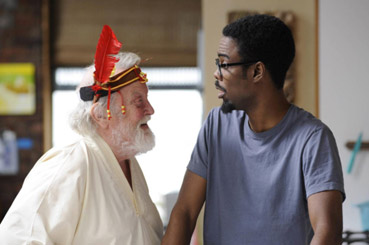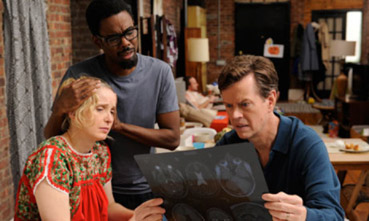|
I remember how excited I was for 2 Days in Paris. Written and directed by one half of Before Sunrise's incomparable coupling and structurally indebted to the swoon of Richard Linklater's cult classic, all those years later, it was hard not to expect more of the same walk-and-talk immediacy and up-close experience of a couple's joy, curiosity, confusion and identification as they traversed the Paris streets. I'm sure writer-director and star Julie Delpy might find the comparison reductive since she'd already been there and done that twice before (Before Sunset was an almost-as-good 2004 sequel) but the posters, trailers, early rave reviews and all other signs pointed towards something in a similar vein, so it was impossible not to hold out fond hopes for a walk down memory lane.
Looking back now, I remember none of the film's particulars, only the anger and disappointment upon leaving the cinema. Completely lacking in the substance and chemistry of Linklater's best, the intended Woody Allen vibe also managed to completely miss the mark. Smug when it tried to be smart and loathsome when it believed itself lovable, you could feel Delpy hard-selling her central couple as cynically whip smart and caustically cute, but their 0-60 hot-tempers and a deluded sense of social superiority as they openly mocked a parade of French stereotypes did quite the opposite actually. I couldn't wait to see the back of them.
However, between the two Linklater films and White, the second part of Krzysztof Kieślowski's Three Colours trilogy, Delpy's nineties prominence ensures a lifetime of goodwill with this reviewer. Doing my best to forget Paris and with expectations suitably lowered this time around, it didn't take a whole lotta arm-twisting to get me to spend another two days with photographer Marion (Delpy) who has wisely dumped Jack the jackass (Adam Goldberg) and settled down with far-more-tolerable Mingus (Chris Rock) in New York. Appearing to have recognised that her last relationship was clearly not big enough for two champion neurotics, Mingus provides increasingly frazzled and flighty Marion some much-needed ballast. The running joke, which runs the duration, is seeing Chris Rock – an unusual choice for the romantic lead of a French film – playing the straight man. With his chipmunk cheeks and Loony Toons eyes, Rock has always looked and sounded like a real-life cartoon character and he's curiously straight-jacketed here given the animation of the ensemble surrounding him.

Having now settled into cramped New York domesticity with Mingus and their two kids from previous relationships, at first glance it appears that these days, Marion's sole obstacle to bliss is finding the time to knock boots – or in this case glasses – as demonstrated by a spluttering, awkward attempt at cunnilingus with glasses still on which introduces her significant other. Theirs is a genial, easy-going marriage but one which can't mask Marion's struggle adjusting to a 2.4 kids lifestyle, "I'm fat, thirty eight, and a pain in the ass" she moans and Mingus is quickly on hand to offer assurance, "but you're French!" Such moments display a deft comic touch but the lack of verbal intricacy means the film rarely graduates from smiles to belly laughs. The humour is at best pleasant, getting one sole audible laugh out of me, never a good sign for a comedy.
Marion's stress level increases exponentially when her uncleanly father (real life Dad, Albert Delpy), nympho-sister (Alexia Landeau) and her pot-smoking boyfriend (co screenwriter Alex Nahon) turn up with all the bawdiness, clamour and subtly of Borat at a Texan anti-gay rally. Thus the scene is set for a series of culture clash faux pas seemingly excavated from episodes of 'Allo 'Allo!
Arriving with a pungent trouser-load of smuggled cheese and sausage, Marion's father's au naturel unwashed scent isn't the only thing that stinks up the place. Chris Rock wrinkles his nose and confusedly darts his eyes during dinner conversations where his English is lost in translation and his straight-laced manner is openly ridiculed in a tongue he can't understand. Much is made of the differing outlook between the nervously puritanical New Yorker and his sexually adventurous relatives. Whereas Mingus is completely freaked out by Marion's sister making love next door as he's trying to do the same, Marion's father doesn't think twice about protesting being put out on the couch where he has no privacy to masturbate. A wine-guzzling, cheese-scoffing pervert with the sex drive of a horny teenager, Mingus' father in-law is a walking cliché of grossly exaggerated nationality but it can't be denied that Delpy has fun with him.

By contrast, Rock is given little else to do but respond with eye-popping incredulity as the behaviour of his unwelcome guests drags us from one calamitous mis-communiqué to the next. Marion being very much self-involved with her upcoming gallery exhibition, essentially feeds her husband to the wolves and leaves him to fend for himself. Stealing a few rare moments of peace in his glorified closet of a study, Mingus is left to confide in a cardboard standee of Barack Obama, an uninspired, flat-humoured conceit of buddy-buddy fantasy, which feels intrusive and progressively more tiresome each time it's revisited. If it's supposed to give us a window into who Mingus is when he's not being besieged by unwelcome guests, it only ever feels like an easy out for Rock, retreating back to the same tired riffs on black culture he's been trotting out since his stand-up days. Mingus seeing his child running around the house in a white sheet, occasions an unnecessary adlib from the comic ("My KKK kid') and many colour tinted rejoinders that are sub-par Woody Allen ("Just cuz he's a black president doesn't mean I can't get critical").
Allen has for many years now taken to casting actors as avatars of himself in the lead. Everyone from Kenneth Branagh to Owen Wilson has had their turn 'playing Woody' (none could be more spot on than Jesse Eisenberg in the upcoming From Rome with Love) and watching this film, there's a feeling that if Allen ever decides to write a female lead, he need look no further than Julie Delpy. Perfectly matching the neurotic affect of her idol's speech and body language, Delpy successfully clones the mechanics of her inspiration, but the character of Marion differs in one crucial regard which often makes Allen's egocentric, hypochondriacs bearable – even lovable: Marion hates everything.
Finding fault with each and every thing has always been Allen's way of humanizing the intellectualism of his characters by pointing out their relative in-experience of real life verses what they read about in books, but there's absolutely no subtext here and great impersonation though it may be, Delpy can't quite get away with it the way she did in Paris. In the native's own backyard it feels like a slight and inconsequential knock off. Plenty of pastiche but no pathos.

Marion is irritable and anxious 24/7 for no other reason than that's how she is. Nothing at all like her irreverent free-spirited family, you start to wonder if maybe she wasn't adopted? An examination of the chasm of personality between Marion and her family members and the way in which the city of New York has deracinated her French roots might have actually gone some way to pulling off the failed attempts at existential grown up seriousness which rub up the wrong way against all the Carry On perving jokes. "2 Days in Therapy" might not have a quite as appealing title hook, but strapping this woman and all her nervous tics to a couch for ninety minutes would no doubt prove much more revealing and relatable. As Mingus has already pointed out for us, it's probably pretty easy being attracted to a miserablist when they're French and played by someone as effortlessly charming as Delpy, but living with them is something for which, in this instance, the man deserves a medal. At the height of her depression about the poor sales of her joyless photographs, Marion makes the ultimate downer artistic statement, by deciding to sell her soul to the highest bidder on opening night (a conversation about the idea of trading your soul being no more absurd than the idea of it existing at all is prime Before Sunrise real estate). It was at this precise moment that I became fearful for the couple's children.
Stumbling in its efforts to match the sour with the sweet, we get a puppet show retelling of how Marion and Mingus first met her father, which has the off-putting flavour of instagram hipster nostalgia. The film works best when it fully embraces the silliness it doesn't manage to temper, the highlight being a cameo from Dylan Baker as the couple's doctor neighbor, advising Marion on her feigned tumor, himself feigning compassion when he become hopelessly distracted by Marion's sister wandering round the apartment with no panties.
That one audible laugh-out-loud moment I spoke of earlier? A third act as-themselves cameo, without so much as the slightest wink of send-up, when the person in question describes himself as an "actor, director, fashion model, poet, biker, legend." To many, this real life attention-seeker is infinitely more intolerable than any of the boorish characters concocted by Deply over the course of two films, so there's something fitting about Marion finally being forced to listen instead of simply waiting for her turn to speak, the biggest narcissist in the room getting to have the last – and best – laugh.
2 Days in New York is currently in limited release from Network releasing.
|